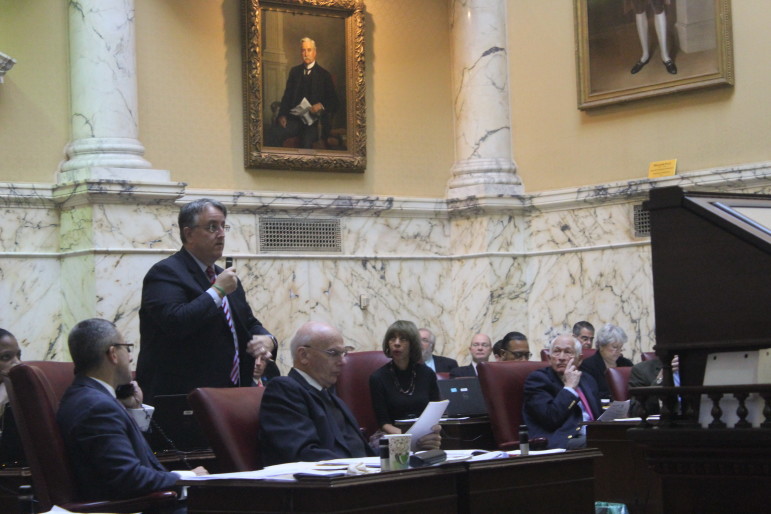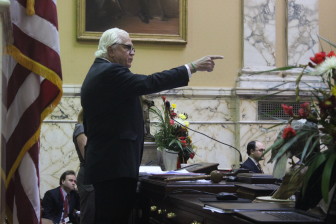By Rachel Bluth
Capital News Service

Sen. Richard Madaleno argues on the Senate floor for an override of the governor’s veto on an Internet hotel tax. Capital News Service Photo by Josh Magness.
Despite impassioned speeches from Republicans, the Democrat-controlled Maryland Senate voted Thursday to override five of Gov. Larry Hogan’s vetoes from last session, and decided to postpone voting on a sixth.
Five pieces of legislation — funding an Annapolis arts center; seizure of assets by police; marijuana paraphernalia decriminalization; and two on hotel taxes — were approved by both the state House and Senate this week. Because both chambers approved the overrides, the bills become law in 30 days, according to the Maryland constitution.
The Senate on Thursday morning voted 29 to 17 — just achieving the 29 votes required for an override — on legislation to decriminalize the possession of marijuana paraphernalia, SB517. Though possession of small amounts of marijuana are no longer a criminal offense in Maryland, the devices required to smoke it remain prohibited.
Worried about toking while driving
Hogan and other detractors worried that legalizing paraphernalia would make it harder to prosecute people who smoked while driving.
“This bill in no way legalizes, decriminalizes or makes OK someone getting behind the wheel of a car and driving while high,” said bill sponsor Sen. Robert Zirkin, D-Baltimore County.
Sen. Robert Cassilly, a Republican from Harford, said it sent a wrong message that driving with an open container of alcohol in the car is a misdemeanor, but driving with a joint — while not intoxicated — is only a civil fine.
“And oh by the way, if you don’t have the funds to pay that civil penalty, you can take those citations and use them to roll your marijuana cigarettes, because you’re pretty much immune,” Cassilly said.
“I find it ironic that the governor wants to invest money in Baltimore to help Baltimore but yet at the same time recriminalize marijuana so a large number of minority youths — African Americans as well as white people — will have a criminal record,” said Sen. Paul Pinsky, D-Prince George’s. “On one hand, we’re investing in buildings, but we’re going to invest criminal attributes to young people who might make a mistake. I find it a little hypocritical.”
Later Thursday, the House of Delegates voted 86 to 55 to also override Hogan’s veto of the paraphernalia bill, just one vote over the 85 needed.
Internet hotel tax
The Senate voted 30 to 16 to override a veto on SB 190, which requires hotel-booking sites, like Travelocity, to give the state the full tax that customers pay.
Now, sites keep a part of the tax as a service fee, instead of remitting the full amount to the State of Maryland. The sites, a brick-and-mortar travel agents as well, have only been paying 6% sales tax on the discounted amount they pay the hotels, not the full charge shown on the customers bills.
Republicans, including Hogan, wanted to wait until litigation in tax court between Comptroller Peter Franchot and Travelocity was finished, but the bill’s sponsor, Sen. Richard Madaleno, D-Montgomery, said that the Senate couldn’t wait.
“I would remind the body that we have been in court now for close to five years with just one company … it is up to us as the legislative branch to set the policy for this state, and not to delegate that authority to the judicial branch,” Madaleno said.
Sen. Andrew Serafini said that this legislation would amount to triple taxation, between the state, the county and corporate income tax.
“Let’s make no mistake, this is a new tax,” Serafini, R-Washington, said.
On Wednesday, the House of Delegates overrode a similar bill that only pertained to Howard County, and the Senate voted 32-14 to do the same.
All the votes were party line votes, with all 14 Republican senators voting to support the action of the Republican governor, joined on some votes by two or three Democrats.
Police seizing assets
By a 32 to 14 vote, the Senate voted to override Hogan’s veto of SB 528, which prohibits police from seizing assets of less than $300 from those they arrest, which Hogan and police said would inhibit law enforcement from going after drug dealers.
Sen. Jamie Raskin, D-Montgomery, who sponsored the bill, said he chose the $300 threshold because that is what he said an hour with an attorney in the state of Maryland would cost. He said the problem with civil forfeiture is that the burden of proof is on the person who was arrested to prove that their money was not being used for illegal purposes.
“I reject completely the claim that this disarms law enforcement,” Raskin said.
He noted the if the police suspect distribution of an illegal substance, not merely possession, they are empowered to take all of the suspect’s assets, even if it is less than $300. The House of Delegates voted 90 to 51 to override that veto as well.
Felon voting rights
The Senate postponed until Feb. 5 a bill granting voting rights to felons who are on parole or probation. The House of Delegates voted to override the bill, HB980, Wednesday with the bare minimum of votes, 85-56.
Karen Montgomery, D-Montgomery, resigned from the Senate last month. She was one of the 29 senators who voted in favor of the bill last session. Once the Montgomery County Democratic Central Committee nominates a replacement, Hogan has 15 days to approve the name, which means a new senator will likely be in office on Feb. 5.
“I think that’s a bit disingenuous to the public, I think they expect us to come down here and do the work with the people that we have,” said Senate Minority Whip Stephen Hershey, R-Caroline, Cecil, Kent and Queen Anne’s. “We shouldn’t necessarily be playing games.”
Senate President Mike Miller, D-Calvert, said he simply wanted everyone to be present for the vote. But he did refer to the closeness of the vote on the marijuana bill.
On Wednesday, the Maryland House of Delegates voted to override Hogan’s veto on funding for Maryland Hall, a performing arts space in Annapolis. The Senate also voted to override that veto.
The $2 million item was part of a tiff between the governor and House Speaker Michael Busch. Hogan had actually put $500,000 in the capital budget for the hall, the former Annapolis High School, in Busch’s district. The House Appropriations Committee raised the amount to $2 million, and Hogan used that to justify the rarely used line item veto.
Len Lazarick of MarylandReporter.com contributed to this story.




Imagine that, dirtballs wanting convicted dirtballs to vote. Democraps have no shame, look at Hitlery.
Also, the argument that decriminalizing paraphenalia PROMOTES impaired driving or somehow hamstrings the police is completely and utterly ridiculous. Ol’ Bob Cassilly needs to update his facts about marijuana. ‘Reefer Madness’ and his ‘marijuana cigarettes’ are LAUGHABLE outdated.
Good for the democrats on these. We have to move away from the 40 yr old massive failure called the War on Drugs. 40 years and what progress has been made? Zero. Billions of wasted dollars. Millions of good people rotting in prison for simple possession of drugs. Thousands being murdered every year in support of cartels and the DEA.
I like Hogan. But he is WAY OFF with his stance on crime and drugs. Get up with the times Larry.
Democrats always put their hands in other peoples’ pockets to fund their unholy lists of nonsense. In the above example Maryland State House exceeded its constitutional authority with violations of the Fourth Amendment of unlawful searches and seizures. When the latter affects liberals they whine like babies.
I believe the police seizing “assets” for a drug POSSESSION case is UNREASONABLE. How, exactly, did they exceed their constitutional authority? They made a law which is the purpose of the legislative branch. The judicial branch will determine if it’s constitutional.
Also- “to fund their UNHOLY lists of nonsense” – Ever hear of SEPARATION OF CHURCH AND STATE? You are about as UNAMERICAN as they come, “Americassage”. You are the sage of nothing.
Fortunately, Republicans in the Maryland legislature don’t have the numbers to be the kind of obstacle to progress that their brothers in the Congress seem to delight in being.
Democrats in the Maryland legislature will do anything to suck more money out of businesses, e.g. on-line booking sites to give the state the full tax that customers pay.